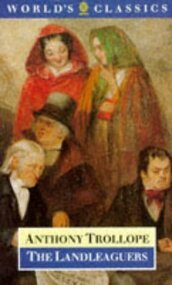
It’s hard to read The Landleaguers (1883) without a lump in the throat, as it was to be Trollope’s final novel. My sentimentality quickly vaporised, however, as it’s not one of his finer moments. The eponymous Landleaguers were Irish farmers who resisted eviction and strove to control their own land. Their tactics ranged from withholding rents and labour, through to death threats and flooding of fields. Famously, they also practised ostracism, which became known as Boycotting, after the name of its first victim. As an inveterate conservative (with a small c), and a tendency to be Tebbity, Trollope is highly critical of the Landleaguers’ actions, with the plot subordinate to the expression of his reactionary views.
Trollope’s writing shouts “No Popery!” on every page, and he suggests throughout that the priests are politicised and agitating for Home Rule. Although blessed with a highly developed sense of fairness, Trollope is a stickler for authority, and would never condone anybody getting above their station. Whilst his anti-Catholicism undermines the tale, there are moments of humanity where Trollope describes brilliantly, but painfully, the appalling consequences of the Famine. And, although critical of the Nationalists, he quotes Parnell: “Why should Ireland be governed by a British Parliament, a British Lord-Lieutenant, a British Chief-Secretary, a British Commander-in-Chief, and trodden under foot by a British soldiery?” Given that he witnessed for himself the devastation caused by the actions of the English during 1845, I find it hard to credit that Trollope still believed they should rule Ireland.
Anyway, back to the novel: Pat Caroll, a tenant and Landleaguer, incites his friends to withhold their rent from landlord Philip Jones. They go on to flood his field, thereby ruining the crops and wiping out his income. Jones’s 10-year-old son Florian witnesses the event. Having just converted to Catholicism, he has promised the local priest that he will not incriminate the culprits, but eventually bows to pressure. Pat Caroll is brought to trial, but Florian is shot and killed on the way to the courtroom and his evidence dies with him.
Florian’s older brother Frank is engaged to a rather pert Irish-American girl, Rachel O’Mahony, who achieves considerable success in London as an opera singer. As the actions of the Landleaguers reduces the Jones family to the brink of poverty, Frank refuses to marry her. Rachel instead becomes engaged to Lord Castlewell, a wealthy patron, but leaves him when she loses her voice. Frank and Rachel are subsequently reunited in their misfortune. The conclusion is unknown, as Trollope completed only 49 of the 60 planned chapters. However, his notes indicate that Frank and Rachel were to marry.
Rachel is the one redeeming feature of the novel. A proto-New Woman — exactly the sort that reduced Trollope to jelly — she is deliciously importunate and impertinent. She wants to earn her own money and scoffs at the idea of being dependent upon a husband. Unfortunately, her importunate father takes advantage of her income to bankroll his inglorious parliamentary career. Guilty of what Trollope pleasingly calls “pachydermatousness”, he is unable to see that he is exploiting his daughter. Rachel’s approach to the other men in her life is more robust: “‘I wish I were bigger,’ she had once been heard to say, ‘because I could hit a man.’” Trollope clearly admires her pluck, but also laments that “there was something missing to her, a feminine weakness, which of all her gifts is the most valuable to an English woman, till she makes the mistake of bartering it away for women’s rights.”
Otherwise, The Landleaguers is a fairly turgid account of the troubles that gripped Ireland in 1879-81. Given Trollope’s passion for the subject, and his strong views, he ought to have plumped for non-fiction. I’d like to think that, had he lived, Trollope would have tightened the plot and toned down the polemicism. As it stands, The Landleaguers is little more than a tract, albeit it one occasional leavened by Trollope’s keen wit and eye for the ridiculous. It’s a shame that this novel was his literary swansong. An Old Man’s Love, written before, but published two years after Trollope’s death, is far more representative of his powers as a novelist.
The Landleaguers by Anthony Trollope